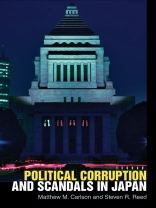Combining history with comparative politics, Matthew M. Carlson and Steven R. Reed take on political corruption and scandals, and the reforms designed to counter them, in post–World War II Japan.
Political Corruption and Scandals in Japan makes sense of the scandals that have plagued Japanese politics for more than half a century and attempts to show how reforms have evolved to counter the problems. What causes political corruption to become more or less serious over time? they ask. The authors examine major political corruption scandals beginning with the early postwar period until the present day as one way to make sense of how the nature of corruption changes over time. They also consider bureaucratic corruption and scandals, violations of electoral law, sex scandals, and campaign finance regulations and scandals.
In the end, Carlson and Reed write, though Japanese politics still experiences periodic scandals, the political reforms of 1994 have significantly reduced the levels of political corruption. The basic message is that reform can reduce corruption. The causes and consequences of political corruption in Japan, they suggest, are much like those in other consolidated democracies.
Tabela de Conteúdo
List of Figures and Tables
List of Abbreviations
Introduction
1. Understanding Corruption in Japanese Politics
2. Scandals in Early Postwar Japan, 1948–1978
3. Scandals and Reform, 1979–2001
4. Scandals and Reform, 2002–2016
5. Bureaucratic Corruption and Political Scandals
6. Sex and Campaign Finance Scandals
7. Election Law Violations as Political Corruption
Conclusion
Acknowledgments
Appendixes
A. Yen Exchange Rate per 1 U.S. Dollar, 1950–2016
B. Prime Ministers of Japan after 1945
Asahi’s Investigation into Election Violations in the 1960s
References
Index
Sobre o autor
Matthew M. Carlson is Associate Professor of Political Science at the University of Vermont. He is author of Money Politics in Japan. Steven R. Reed is Professor of Policy Studies at Chuo University. He is author of many books, including Making Common Sense of Japan.












